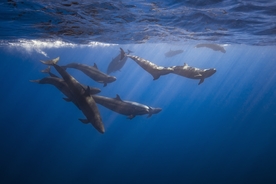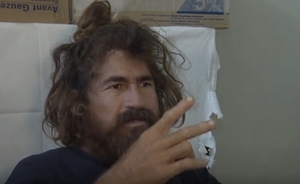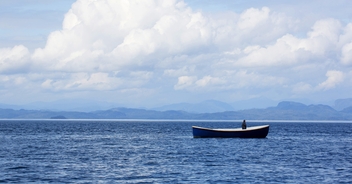Twenty years ago, French-born long distance swimmer Benoît Lecomte swam across the Atlantic Ocean in 73 days. The purpose of the journey was to raise money for cancer research, as a tribute to his father. He claims to be the first person to complete the 5,000 swim without a kickboard. (And just think how much he saved by not buying a plane ticket!)
Now the 51-year-old Frenchman is attempting to swim across the Pacific Ocean. Today he began his expedition by jumping into the waters off the coast of Tokyo. If everything goes according to the plan, he will arrive in San Francisco in six months.
This time Lecomte is trying to raise awareness for plastic pollution. His 5,500 mile journey will take him past the famous Great Pacific Garbage Patch - 80,000 metric tons of floating trash in the sea. According to a three-year study in Scientific Reports, it is currently more than twice the size of Texas.
Every day Lecomte will swim for eight hours, which will cover about 30 miles. Then he will board the boat accompanying him to sleep and eat. Meals are important. In order to have enough energy for the expedition, he'll need to consume 8,000 calories a day. (And while he's swimming, the crew in the boat will collect samples, probe the water quality and do other sciencey stuff.)
The crew on the boat will use a GPS tracker to mark where he leaves the water, so he can enter it at the same point the next day. Lecomte will wear a wet suit, swim cap, snorkel, goggles, fins, EKG waterproof holter monitor, Rad Band Radioactive Cesium Collector and shark repellent bracelet. Yes, shark repellent bracelet. He said when he swam across the Atlantic, a shark followed him for five days. (How's that for motivation to swim faster?)
But sharks aren't the challenges Lecomte will face. There's also jellyfish, all that "plastic smog" and most dangerous of all, the extremely cold temperatures. And of course, there's the physical challenge, to keep up his stamina, as well as the mental challenge, to keep his mind focused. For the next six months, he'll be swimming in the ocean alone for eight hours a day. (Hope he bought a waterproof iPod.)
As Lecomte embarks on this record-breaking journey, you can track his progress on Seeker. They plan to broadcast live coverage, post a short documentary every two weeks, and release a feature-length documentary once the expedition has comet to an end.
If he's able to complete this quest, it will be a pretty impressive display of athleticism. But this isn't about vanity. Lecomte hopes that he will inspire more people to address the serious issue of plastic pollution. Research scientist Britta Denise Hardesty told CNN that we can all do our part to help:
"Plastic pollution in the ocean is visible and trackable. We can definitely make a difference in how we vote with our pocketbook and think about each decision we make, whether we take our own bags to the supermarkets, refuse straws, bring our own coffee cups, accept single-use items or think about mindful alternatives."
Hey, it's a lot less work than swimming across the Pacific Ocean.



.jpg_BU8s2y?tr=h-184)

